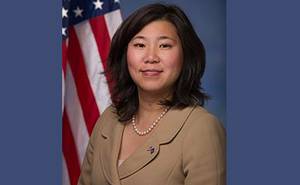A member of the US Congress has written to major US apparel buyers, asking them to help Bangladesh’s readymade garment owners improve factory safety and security.
The foreign ministry on Sunday said Grace Meng, member of the Congress from the sixth district of New York, told the Bangladesh’s permanent representative at the UN during a “special meeting” in New York on Thursday that she had written to 15 such buyers.
She also asked Ambassador AK Abdul Momen about steps formulated by US garment buyers to improve safety standards in Bangladesh’s apparel factories.
Meng promised to raise the issue with the authorities about Bangladesh’s concern over the payment of 16 percent tariff for readymade clothes exports and try to find a way out.
Ambassador Momen told Meng that despite being an LDC, Bangladesh was being made to pay 16-32 percent tariff to the US market, whereas developed countries pay only 0.5 percent to 2 percent or in cases have to pay no duty altogether.
He said the US was known as the friends of the poor but there was a “departure” in this case.
He also told Congresswoman Meng that the US export had increased about 42 percent in 2013, but Bangladesh’s exports rose only nine percent over the same time.
The meeting came amid Dhaka’s demand for the restoration of the suspended GSP privileges of some of Bangladesh’s exports items in the US market and allowing the country’s main export products – readymade clothes – duty-free access.
The US administration suspended the preferential trade facility in July last year in the wake of Bangladesh’s worst-ever building collapse in Savar that killed more than 1,100 workers
The US has been saying that the GSP decision was intended to improve factory safety and workers’ rights.
However, Bangladesh’s ambassador in Washington recently said it had, instead, “put the workers in jeopardy”.
Momen also called for duty-free market access for Bangladeshi products in his meeting with Meng.
“If the US really wants to help Bangladesh’s poor women, then they should allow duty-free access,” he said.
“At least for two to three years so that owners can improve safety and security of their factories further.”
Charge d’affairs of Bangladesh’s Washington mission Mohammad Abdul Muhith was also present at the meeting.
Momen said, in the 90s, US-Bangladesh joint efforts had helped the ready-made clothing sector purge child labour without allowing anyone to fall into distress.
In the current safety reform, he observed, the solution should not cause job losses.
The Congresswoman appreciated Bangladesh’s efforts to ensure factory safety and the increase in minimum wages.
She also praised Bangladesh’s socio-economic development and expressed interest in working with Bangladesh in improving trade, businesses, investment and people-to-people contact.
Meng accepted an invitation to visit Bangladesh, the foreign ministry said.
Source: UNBConnect









